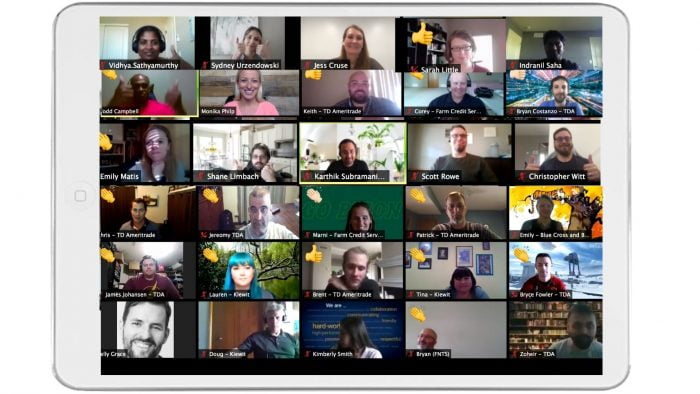
In Todd Campbell’s home recording studio, a Fender Telecaster rests against a small amplifier in front of a green-screen wall that doubles as a backdrop for the tech leadership classes he teaches virtually.
Whenever the application development senior manager for TD Ameritrade gets stuck on a hard technical problem and needs a respite from the analytical grind, he likes to let loose and work on music here, in his safe haven for creative expression. It’s a process that has given birth to two smooth-jazz-inspired solo albums and kept him grounded through a demanding career.
With over 30 years working as a Black man in technology, Campbell has a lot to express. He does so with gusto, humor, and a born-storyteller’s knack for captivating an audience.
These are the qualities that have made him a role model and mentor for hundreds of students in AIM Institute’s tech leadership academies, where he has taught classes on leadership development for emerging and established IT professionals since 2017. (AIM is a not-for-profit working to remove barriers to tech education, increase equity in the IT workforce, and help Omaha become a place where anyone can pursue a rewarding career in technology.)
Now, he has just taken on the role of chairman for the steering committee of AIM’s leadership academies. His vision? To encourage knowledge-sharing among the committee’s membership—made up of leaders in Omaha’s tech community—about the most important issues IT departments will face in the near-term.
“In the next five to seven years, the biggest thing that we’re going to be dealing with is cultural issues and diversity,” Campbell said.
While an increased focus on representation at work might sound like an obvious move to younger generations, this mindset-shift is a major evolution in the workplace.
“In the last ten years, things have really turned,” Campbell said. “People now realize successful companies have to be diverse—however you want to categorize and define that. I think everyone already knew it, but I don’t know if they could quantify it. But now, if you have a diverse company, there are stats that say you’re going to be more successful than the company where everyone looks the same.”
It’s a long way from how things were when Campbell was getting ready to launch a career. Early on, the self-described “geek at heart” received some challenging advice from his computer programmer father.
“Growing up, it was different,” Campbell said. “I remember my father saying to me, ‘Listen, if the scale is from one to eight, you gotta be a nine. If everyone else is getting B’s, you gotta get B-pluses or A’s, because you’re a little bit behind.’ And I didn’t know what he meant.”
He soon found out. After taking a gap year to tour as a guitarist, Campbell enrolled as a computer science major at the University of Nebraska at Omaha. Upon graduating, he took a programming job for a few years before joining TD Ameritrade as a software developer, where he continued to notice a distinct lack of color in the echelons of business.

“In the first 10 to 15 years of my career,” he said, “it was a struggle for me to look at all senior management and see no people of color. I’d think, ‘Wait a minute. I have aspirations to be a great leader. How am I going to do this?’ Because I don’t see any people of color. I don’t see any women. I don’t see anything but older white men. I’m not going anywhere.”
Not only did he notice the lack of diversity in leadership, he felt a pressure that many Black professionals feel in the workplace, one that white people have historically never felt: the pressure to seem as non-threatening as possible.
“In the first 20 years, I almost was subdued,” he said. “I’m 6-foot-2, 230 pounds, big bald Black guy, and I didn’t want to be this overbearing kind of person. So I almost was either subdued, or very laid back, or I just used humor because I didn’t want people to be overwhelmed by me. I tried to make light of things.”
As times change, however, Campbell said he has felt freer to be himself at work: the left-brain, right-brain geek leader who loves heavy metal, martial arts, problem-solving, storytelling, conversation and social connection.
In fact, a couple weeks ago, Campbell said he felt a little teary-eyed with gratitude during a routine standup meeting he was leading. A year deep into a devastating global pandemic, layered with the change brought about by TD Ameritrade’s recent merger with Texas-based financial services company Charles Schwab, Campbell was impressed with how everyone was adapting to the background noise of unpredictability. He told his team that he loved them, something he said he would not have felt safe to do earlier in his career.
From heads-down software developer to team-building tech manager, Campbell’s ability to cultivate genuine rapport with people has supported his rise.
“Todd is a great community builder, tech advocate and leader,” said Monika Philp, director of tech leadership development for the AIM Institute. “He’s a wonderful teacher, beloved by his students and colleagues alike, and AIM is grateful for his support; he’s the perfect choice to head our leadership academies’ steering committee.”
And in an era of civil unrest, his expertise and perspective are more in-demand than ever.
He said he thinks now is the perfect time to be a leader, to bring people together, find common ground and construct an environment of inclusion and connection.
“I think people are always looking to connect,” he said. “I would not be where I am without my abilities to tell stories and to relate and to connect.”
